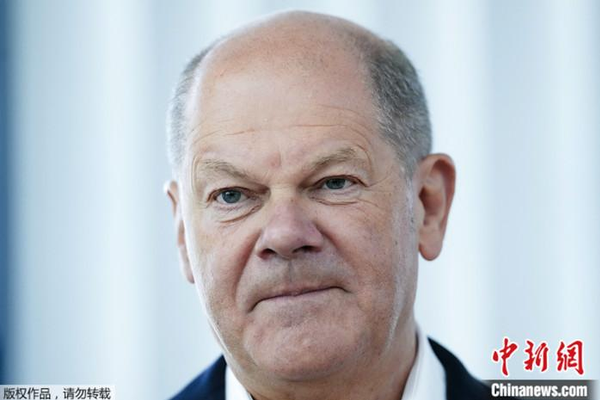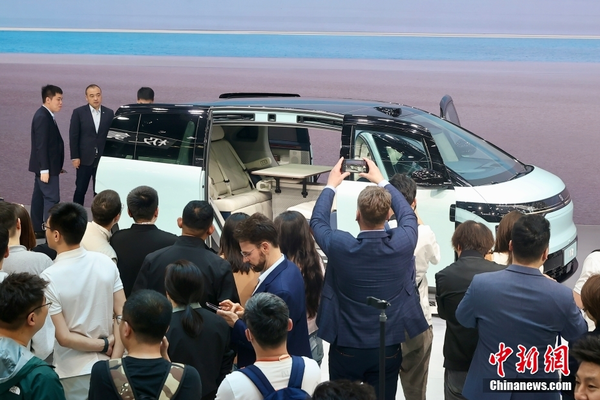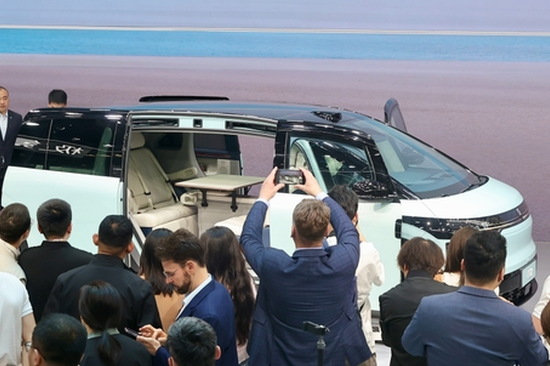(W.E. Talk) EU's punitive tariffs on Chinese EVs bring no winner
By Chen Tianhao, Wei Chenxi,
(ECNS) -- “The EU’s decision is regrettable, and I think everybody will lose,” noted Michael Schumann, chairman of the Board of the German Federal Association for Economic Development and Foreign Trade, in the latest W.E. Talk with Ding Chun, director of Centre for European Studies in Fudan University. Ding echoed Schumann’s sentiment, claiming that “any trade war is too heavy to bear”.
The EU’s decision to impose five-year countervailing duties on Chinese-made EVs has sparked strong opposition. So how is this move perceived from around the world? What impact will it have on the European markets? Is there any contradiction between EU’s decision and its long-term sustainable development goals? And why has Germany voiced strong opposition to these tariffs?
To explore these questions, both experts are invited to share their insights on these topics.
German carmakers seek no “protection”
Although the EU argues that its punitive tariffs are intended to protect the European auto industry, Schumann noted that “the industry doesn't want to be protected, at least not in Germany.”
German Chancellor Olaf Scholz also criticized the EU’s decision to impose punitive tariffs on EVs made in China stressing the importance of maintaining open markets.

Why, then, is Germany opposing the EU’s decision? According to Ding, there are two reasons. First, as a leading car manufacturing nation, Germany’s auto industry is deeply tied to the Chinese market. “Considering its sales in the Chinese market, it is impossible for Germany to easily give up such a lucrative market that has been deeply cultivated,” Ding noted, adding that the China-Germany partnership is one of the most important partnerships between China and European countries, with trade and investment closely intertwined. “So the bilateral cooperation is very resilient.
Data from China’s Ministry of Commerce also shows that the trade volume between China and Germany accounts for one-third of the total between China and Europe, while Germany's investment in China accounts for one-third of the EU's investment in China. Furthermore, the Federal Statistical Office (Destatis) reports that China was Germany's most important trading partner in 2023 for the eighth consecutive year.
Ding thinks that as a major export-driven country with a manufacturing-based economy, Germany relies heavily on free trade and the exchange of goods with other countries. “Otherwise, its export-oriented economy would be severely hampered or even damaged.”
“So Germany is opposed to trade protectionism or trade remedy measures to resolve relevant economic disputes,” said Ding Schumann, stressing that both Germany and the EU have always been benefiting from open markets.
EU’s tariffs yield no winner
So what will happen after EU’s decision to impose punitive tariffs on made-in-China EVs? Ding analyzed that the move is expected to strain bilateral economic and trade relations between China and Europe. “Any trade war is too heavy to bear,” Ding said, adding that protectionism will directly reduce Chinese-made EVs exported to the EU.
Schumann also argued that the countervailing duties do not lie in the interests of the people in Europe. “Not only Chancellor Schulz has been very outspoken in his opposition to these measures, so has the German automotive industry,” he said.
In Schumann’s view, the countervailing duties will definitely hit European carmakers, with costs likely to be passed on to consumers. Therefore, European consumers may lose access to Chinese-made EVs with better technology and higher cost performance, leaving them with alternative models that could be nearly twice as expensive.
“There are companies like Volkswagen that are working on cheaper models, but that probably will take another two years from now,” Schumann predicted, “so prices will not lower in the foreseeable future.”

A third concern raised by the punitive tariffs is their contradiction with the EU’s long-term sustainable development goals. Both Ding and Schumann agreed that they may not have a significant impact on the business operations of Chinese carmakers. However, Ding noted that the EV charging infrastructure in many European countries are imperfect, reducing EVs will affect the pace of its supporting infrastructure development.
Schumann added that in recent years, Europe has prioritized environmental and climate protection above other factors. “The green deal and everything regarding European policies is about taking the green transition seriously,” he said, “but you don't see a lot of EVs driving in European streets, so that's far behind our targets.”
“It's a bad situation for everyone and the decision will not lead us to a faster transition to green mobility,” Schumann concluded.
Why is the EU so stubborn?
So why is the EU insisting on pressing the “tariff button”? Schumann explained that on one hand, the EU Commission wants to position the EU as a geopolitical bloc with independent negotiating power, and has a strong negotiation position for future trade imbalances and trade conflicts. On the other hand, he suggested that quite a few countries are being held hostage by American interests.
Schumann also pointed out the lack of consensus inside the EU. Countries including Germany, Spain, and Hungary have voiced opposition to this EU move. “The EU would like to have a unified position, but it’s not there yet,” he said.
Schumann further noted that now the EU member states are battlegrounds in the great power competition between the U.S. and China and there has been a lot of hype and media coverage constructing Chinese EVs as a threat. He questioned this narrative by pointing out that Germany, a major car exporting nation, has never faced accusations of overcapacity or flooding other countries' markets.
Ding noticed that under the current climate, agreeing to impose these punitive tariffs on China appears to have become a form of "political correctness" within the EU. Influenced by reverse globalization and over-securitization, the EU increasingly emphasizes that China is an economic competitor and a systemic rival. The reason behind the tariff decision is driven by its relative lack of competitive advantage in the industry, growing anxiety, and lack of confidence in its own industrial competitiveness.
A fair and right balance needs to be found
“We are living in a changed world now,” said Schumann, “and we are starting to feel the pressure on our industries and markets in Europe following the EU’s decision to impose tariffs.” Therefore, Schumann thinks that the EU needs to find a balanced approach to allow European consumers access to world-class products and world-class technology, while also preserving Europe’s own industrial strengths and capacity.
Schumann suggested that the EU could learn from China, which has taken very reasonable measures to protect its own market and industry while benefiting from foreign products, foreign technology and foreign investment.
He added that there's a huge variety of tools the EU can resort to, and one is price commitments. But he does not consider it as the best way. “We need more investment and more production in Europe, and we need more stable jobs to have our population safe and sound,” Schumann suggested.
Despite the current phase of intense industrial competition and trade conflicts, both experts agreed that the door to negotiations remains open for both sides. “There’s still room for both sides to negotiate and seek suitable ways to resolve their disputes,” said Ding, adding that the key lies in whether the EU can assess the situation wisely and approach China with rationality and goodwill to reach compromises and seek mutually acceptable, second-best options while avoiding an all-out trade war, which would harm both sides.
“If China and the EU can, in accordance with a principle, especially at the technical level, find a solution that conforms to the rules of the World Trade Organization and is acceptable to both sides, then to a certain extent, we can eliminate the negative impact of the countervailing duties on EVs imported from China,” concluded Ding, “In this way, I think it should be a win-win situation for both sides.”
Schumann agreed, emphasizing that “we need to engage in talks, discussions and negotiations all the way, all the time at every possible instance and to rid ourselves from ideological constructs that try to politicize economic relations.”

